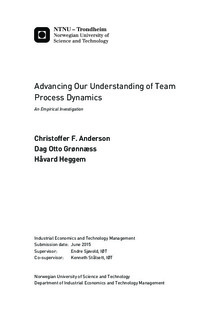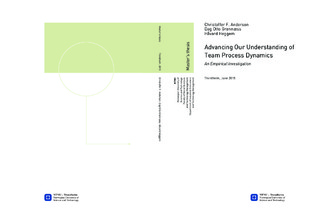| dc.description.abstract | ABSTRACT
This study comprises two independent articles, which are tightly interlinked in their overarching focus on team process dynamics. In the first article, we design a longitudinal study where we use a combination of retrospective self-reports and in-depth interviews to uncover the changes in internal dynamics of teams that participate in an 11-week exercise. Subsequently, we attribute these changes to a range of external and internal factors. The findings suggest that most of the investigated teams faced unquestionable positive developments following their participation in the exercise. These include an increased group cohesiveness, greater flexibility in the social role structure, higher similarity across team members understanding of the task and team interactions, and a more equal distribution of the leadership influence. The outcomes are seen as clear indicators of the importance of providing feedback to learners, and of providing teams with tailor-made team building modules to facilitate their development.
In the second article, we engage in a more methodologically-driven approach, as we combine the use of retrospective self-reports and technological devices capable of direct big data -capturing of team interaction contents. The investigations are undertaken during two high-fidelity simulation exercises, which allow us to map the participating teams dynamics. Our findings suggest that big data may well revolutionize the way we investigate human interaction in time, however, as it stands, the lack of a sufficiently large empirical research pool means that it still represents a qualitatively poor source of data. Thus, we argue that analyses of big data could be even more fruitful as a supplement to more traditional approaches. | |

